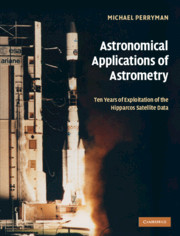Book contents
- Frontmatter
- Contents
- Preface
- 1 The Hipparcos and Tycho Catalogues
- 2 Derived catalogues and applications
- 3 Double and multiple stars
- 4 Photometry and variability
- 5 Luminosity calibration and distance scale
- 6 Open clusters, groups and associations
- 7 Stellar structure and evolution
- 8 Specific stellar types and the ISM
- 9 Structure of the Galaxy
- 10 Solar System and exoplanets
- Appendix A Numerical quantities
- Appendix B Acronyms
- Appendix C Author gallery
- Index of first authors
- Subject index
Appendix A - Numerical quantities
Published online by Cambridge University Press: 23 November 2009
- Frontmatter
- Contents
- Preface
- 1 The Hipparcos and Tycho Catalogues
- 2 Derived catalogues and applications
- 3 Double and multiple stars
- 4 Photometry and variability
- 5 Luminosity calibration and distance scale
- 6 Open clusters, groups and associations
- 7 Stellar structure and evolution
- 8 Specific stellar types and the ISM
- 9 Structure of the Galaxy
- 10 Solar System and exoplanets
- Appendix A Numerical quantities
- Appendix B Acronyms
- Appendix C Author gallery
- Index of first authors
- Subject index
Summary
Numerical quantities This compilation of numerical quantities includes both fundamental defining quantities, and certain relevant derived and associated reference quantities. The system of astronomical units relevant for astrometry is essentially defined by four numbers: the length of the day, d; the mass of the Sun, M⊙, or in practice GM⊙; the astronomical unit, Am; and the Gaussian constant of gravitation, k (a discussion of the complexities and limitations can be found in Klioner 2008). Many of the quantities here have been compiled for the Gaia mission's parameter database by J. de Bruijne. As a result of changing definitions, some of the physical constants used in the construction of the Hipparcos and Tycho Catalogues (Table 1.3, notably Am, GM⊙, GM⊕ and ∈) have been updated compared to those listed on page 9. Other comments are as follows:
CODATA06: these parameters are ‘2006 CODATA recommended values’, from the CODATA Task Group on Fundamental Constants (see http://www.codata.org and http://physics.nist.gov/cuu/Constants).
INPOP06: self-consistent (TCB-compatible) Solar System quantities from the numerical planetary ephemeris developed at the IMCCE–Observatoire de Paris (Fienga et al., 2008). They provide an alternative to the JPL development ephemeris solutions DE405 and the latest version DE414 (Konopliv et al., 2006).
IAU(1976): the IAU (1976) system of astronomical constants.
The astronomical unit (in m) is a defining constant in INPOP06, consistent with the combination of the light travel time and the speed of light used in the JPL DE solutions.
The value here is derived from the other defining quantities (CODATA06 gives 5.670 400(40) × 10–8).
Information
- Type
- Chapter
- Information
- Astronomical Applications of AstrometryTen Years of Exploitation of the Hipparcos Satellite Data, pp. 619 - 622Publisher: Cambridge University PressPrint publication year: 2008
